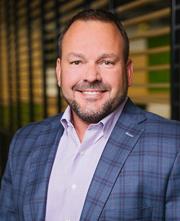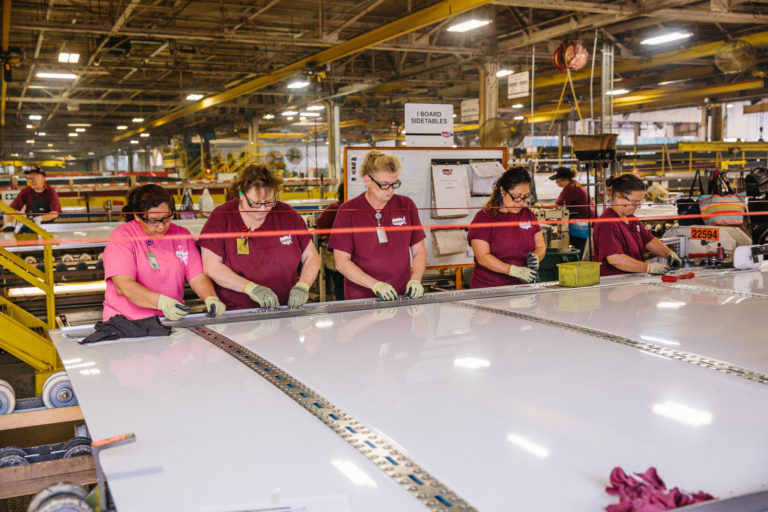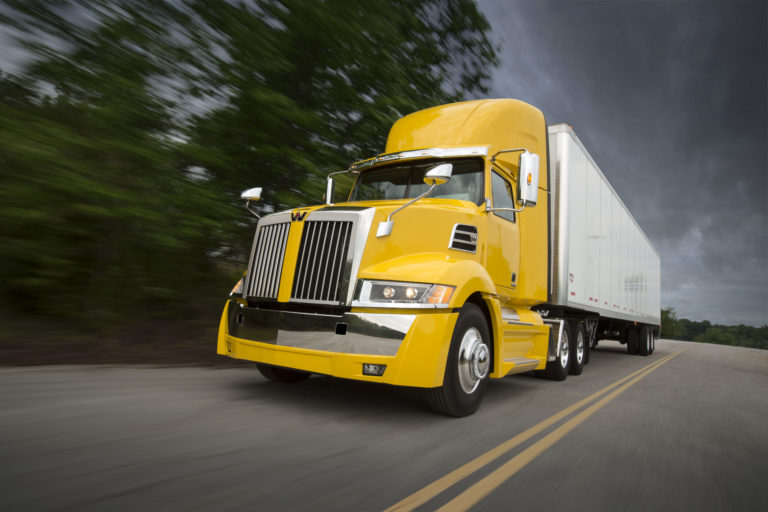BY KEN THOMPSON
PHOTOS PROVIDED

A major presence in the Greater Lafayette economy since 1985, Wabash National has positioned itself to prosper during one of the toughest periods in our nation’s economy. The manufacturer is a leader of engineered solutions in transportation, logistics and distribution.
Instead of fighting for survival during the nearly two years of COVID-19 and its side effects, Brent Yeagy, president and CEO, saw this time period as a chance to regroup and make plans to take advantage of the post-pandemic business world.
“I think it has given us the opportunity to look at the world a little differently,” says Yeagy, whose degrees include a bachelor’s in environmental engineering science and a master’s in occupational health and safety engineering from Purdue University.
“Anytime we have something as disruptive as a national pandemic, things begin to change the world around us. Some for the negative and ultimately there’s things that have a positive nature to it, or at least an opportunity.”
Decreed an essential business due to the economic impact of its semi-trailer and tank trailer production, Wabash National and the more than 6,500 employees nationwide successfully met the social challenges that came with COVID-19.
“The biggest challenge was the initial speed of change and the uncertainty that would be provided by the national government in how best to manage the situation,” Yeagy says. “That gave businesses an unclear footing as to how best to take care of their employees, how to navigate the downturn in the economy and how to forecast what would come next.”
Yeagy had to balance critical decisions with both the Wabash National shareholders and his employees’ best interests.
Fortunately, the methods to protect those 6,500-plus employees were a far more simple task.
“We did an excellent job across the country in managing everything from how to use PPE, contact tracing and all those things that go around it,” he says. “What was hard is that underlying social impact that occurs. How do you manage a 6,000-plus workforce with schools closed? You don’t have child care. We really had to think of a very innovative way to manage those needs during a really hard time for our employees.”
Wabash National has altered its thinking to the new economic reality that puts more and more emphasis on e-commerce.
“For us, commerce has been a driving force in new opportunities for new products, new customers and new markets that we can position Wabash going forward,” Yeagy says. “We have altered our strategy to what we call ‘First to Final Mile,’ where we look at products and services that span across all logistics, including e-commerce.”
Among those new opportunities was the purchase of Supreme Industries, a Goshen, Ind.-based truck body business.
“We’re launching new products to meet the needs of these changing logistics accordingly. So we think for us, this is a sustainable change that will drive future growth for Wabash over the next decade.”
A noticeable change coming to the company is its name. Recently, it dropped the National part of its brand to become simply “Wabash.”
“We want to tell a story that we’re not the same Wabash,” Yeagy says. “We’re not Wabash National, we’re Wabash. We stand for something different. It’s a reflection of the dramatic organizational and structural changes that we have completed over the last two years that position us to truly grow across the company, to become the visionary leader across a growing transportation and product solution state.”



Greater Lafayette and Purdue University want to play a role in Wabash’s future. With $70 million in investments planned for its two Lafayette plants during the next two years, Wabash and the city of Lafayette agreed to a $25 million tax abatement during that period.
“I think first and foremost it shows trust in Wabash by the city of Lafayette and its leadership,” Yeagy says. “That allows us as a corporation that spans the entire country in terms of operating facilities to continue thinking of Lafayette as a place that we can invest as well.
“Specifically, it allows us to think about job creation opportunities that we have here in Lafayette to support some of the more high-tech product applications that we are bringing to market. As we think about re-capitalizing the equipment in Lafayette that’s been around in some cases for the last 20 years, it allows us to go deeper into the roots we have here. Which means that we can continue to be a contributing part of the community for some time.”


Lafayette is home to about 3,000 of Wabash’s employment force.
Greater Lafayette is also home to Purdue, whose resources are going to play a key role in Wabash’s future. Yeagy cites an unprecedented relationship forged with the Board of Trustees and Purdue President Mitch Daniels.
“We have connected with Purdue in a way that has never occurred in Wabash’s history,” Yeagy says. “We are now a major athletic partner. We are directly reaching Purdue students to the nature of technical skills we are trying to bring into Wabash as we execute our strategic plan.”
Wabash has a direct partnership with Purdue’s Data Mine, which is aiding the company’s multiple data science-related projects. Wabash also holds office space both at the Convergence center and the Railyard. An even longer term relationship with Purdue centers on welding safety and health-related research.
“It allows us to have a significant portion of our workforce to be closer to Purdue as well as we now have space for students, interns and other related academic project work to be done on campus,” he says.
“We are extremely excited about what it means, not only for Wabash but the Greater Lafayette community.”
As Yeagy points out, Wabash’s reach is nationwide. Just look at any highway or road and it’s a matter of time before one drives past a semi-trailer, tanker or truck body manufactured by Wabash.
“There’s the absolute pride you feel when you see something that you’re attached to so intimately as the product you produce on our nation’s highways and roads,” Yeagy says. “But as a CEO, being able to step back, you know the people that produced them. You know the work. You know the challenges that were faced to get that product on the road, especially the last two years. You know peoples’ stories that went into building that product. When I see it, I think of all that.
“People should understand they have a corporate entity in their community that builds the safest, most sustainable products in commercial transportation. I think that’s lost at times.” ★


